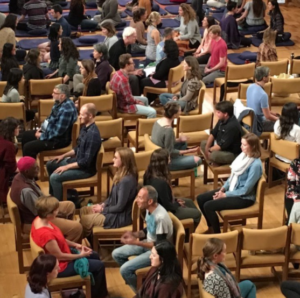
Each year, the Mind & Life Institute hosts the Summer Research Institute to bring together scholars, researchers, professionals and practitioners from a variety of fields who share an interest in contemplative research. The purpose of this program is to bring students, recent graduates, junior faculty and postdocs into conversation with established investigators in order to create a context for a robust, interdisciplinary dialogue that is intellectually rigorous and open to new voices that will challenge, advance and transform research as we know it.
The theme of the 14th annual Mind & Life Summer Research Institute was “Intersubjectivity and Social Connectivity,” and this topic was woven throughout the very structure of the week, with extended Q&A periods and contemplative dyads complementing the more traditional schedule of plenary lectures, panels and meditation sessions. From June 5–11, 2017, in the intimate and retreat-like atmosphere of the beautiful building and grounds at the Garrison Institute, 130 participants from 23 countries gathered to discuss the state of contemporary contemplative research and possible future directions for it, and to learn from those with different cultural and institutional backgrounds.
“I was awed by the diversity of topics and expertise, and I greatly appreciated the approach of the meditation and bodywork teachers.”
Numerous distinguished faculty brought perspectives from psychology, social neuroscience, philosophy and religious studies, among other fields. Plenary lectures covered a breadth of research, highlighting topics including: the influence of social connection on threat processing; philosophical approaches to enaction and intersubjectivity; Buddhist perspectives on interdependency; the importance and changing nature of our regular interactions in relationships; and the benefits of mentorships for underrepresented groups. Breakout sessions gave faculty and participants opportunities to more deeply explore topics from the plenary presentations, engaging in richer discussion and Q&A. Previous Mind & Life Varela grant recipients presented their projects, and poster sessions allowed participants to learn about recent findings in contemplative research and discuss those results with the authors in attendance.
A defining feature of the Summer Research Institute is its incorporation of daily contemplative practices and the inclusion of a full day dedicated to silent retreat. The contemplative faculty led participants in yoga, formal meditation and T’ai Chi sessions every day. The spontaneous inclusion of contemplative dyads — experiential and interpersonal practices done in pairs — was so well received that the practice was reintroduced two more times during the week. These dyads provided a unique opportunity for first-person experience of interconnection, complementing the philosophical and psychological constructs described throughout the program, such as social baseline theory and participatory sense-making.
“Wonderful! Varied, interesting, engaging and really conducive to making individual connections. All of those were especially useful for trainees, like me.”
Building on last year’s theme regarding the importance of context, diversity and inclusion in research was a prominent focus of the week. This Summer Research Institute brought a more in-depth exploration of ways to support young researchers from underrepresented groups and to diversify the populations sampled in studies. This is vital scientifically as well as ethically, because it allows for more accurate findings across populations and cultures, and can help to ensure that certain experiences and interpretations are not differentially excluded from study and analysis. Furthermore, not everything may be best understood through a scientific lens, and other modes of knowing and studying minds — and the world in general — offer their own unique benefits. But any research study that aims to investigate and understand the mind becomes limited in scope if those being studied, or those doing the studying, disproportionately represent certain backgrounds.
A primary goal of the Summer Research Institute is to foster collaboration across disciplines. This year’s schedule included two workshops dedicated to understanding and enhancing transdisciplinary research. Following overview presentations, participants broke into groups for an experiential taste of working with people outside of their academic or professional silos. A critical insight that emerged was the importance of the sociocultural background in which research is designed and carried out, and the benefits of including other perspectives, particularly from anthropologists, in laboratory research teams. Such practices help to ensure that scientists do not lose sight of the fact that the minds which study other minds are also embedded in a certain cultural context that influences every part of their inquiry, from what is studied to how the results are interpreted.
Overall, the week cultivated a sense of excitement and self-efficacy, reminding us that we can all work to foster inclusivity in our academic, professional and personal communities, and demonstrating that contemplative research may be uniquely suited to bridge the gaps that too often separate academic, applied and first-person investigations. Mind & Life is committed to advancing this research, which it sees as essential in moving toward the broader goal of alleviating suffering and promoting flourishing for all human beings.

